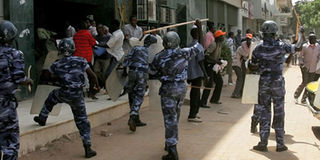South Sudan foes mend fences in vote run-up

AFP | STR. Sudanese police use batons to disperse demonstrators who were calling for independence for south Sudan during a pro-unity rally in Khartoum on October 9, 2010. The south Sudanese leadership has been setting aside its differences with armed dissidents and civil war militia foes as a landmark referendum on independence for the region looms in January.
JUBA, Wednesday
The south Sudanese leadership has been setting aside its differences with armed dissidents and civil war militia foes as a landmark referendum on independence for the region looms in January.
Southern regional president Salva Kiir has offered an amnesty to rebel fighters and sought to reconcile with his leading political adversary, former foreign minister Lam Akol, in a bid to ease tensions in the run-up to the vote.
"There is a need to stand together as southern Sudanese," Kiir told delegates to a three-day All South Sudan Political Party Conference that opened on Wednesday in the regional capital Juba.
"We need to build consensus between people in order to build a free, fair, transparent and peaceful referendum," he said.
"Having differences of opinion does not necessarily disqualify a people from determining their future, and we have to look beyond petty quarrels."
The independence vote is the centrepiece of a 2005 peace deal between Kiir's former rebel Sudan People's Liberation Movement and the Arab-dominated Khartoum government that ended Africa's longest-running civil war in which some two million people died.
The SPLM heads an autonomous regional government established under the terms of the peace deal but it has faced continuing armed opposition from militia groups which supported the north in the two-decade civil war and dissidents opposed to its hold on southern political life.
Offering a "warm welcome" to Akol at this week's conference to loud applause from fellow delegates, Kiir told his rival: "Political differences should not become obstacles to the general public good."
Akol, who defected from the SPLM during the 1983-2005 civil war, was the only challenger to Kiir in elections for the southern regional presidency in April.
He set up a breakaway faction, SPLM-Democratic Change, last year and has faced repeated accusations from Kiir's mainstream party of seeking to undermine next year's referendum.
"The most important thing for all of us is how to do and prepare a conducive atmosphere for the referendum," Akol told AFP, adding his party members had been harassed in the past.
"Now we are closing this chapter and we will work together as political parties in the political scene," he said.
Kiir has declared a pardon for all "armed groups", including pro-Khartoum civil war militias like that of Gabrial Tang, now a senior figure in the northern army.
"I also declare amnesty for all those who took up arms after the elections" in April, he added.
The dissident SPLM commanders include renegade colonel Gatluak Gai in oil-rich Unity state, as well as George Athor, a senior southern officer who began a rebellion after losing the governorship election in the eastern state of Jonglei.
"They should all lay down their arms that they have been using against the system in the south, so that they can explain what is the problem that is not yet resolved," the southern leader said.
Southern military commanders have accused the dissidents of acting on behalf of Khartoum to destabilise the south in the run-up to the independence vote, a charge denied by the central government.
"The pardon is accepted," said Athor, speaking on the UN-backed Miraya FM radio on Monday, adding he would send a delegation for talks with the southern leadership.
Negotiations also began last month with David Yauyau, who led an uprising in the Pibor area of Jonglei after alleging fraud in April's elections and accusing the SPLM of corruption.
Political violence in the south, much of it fanned by ethnic rivalries and conflict over land use between herding and farming communities, has killed nearly 900 people this year and forced more than 188,000 from their homes, according to UN estimates.
Kiir, who is also first vice president in the national unity government in Khartoum set up under the 2005 peace deal, shared the platform at Wednesday's conference opening with his fellow vice president, veteran northern politician Ali Osman Taha.
"No drop of blood should be shed again," Kiir said.




